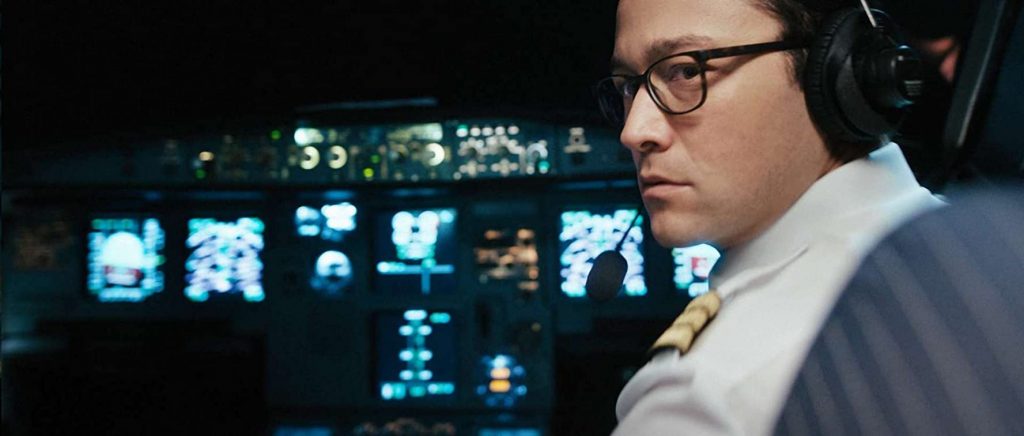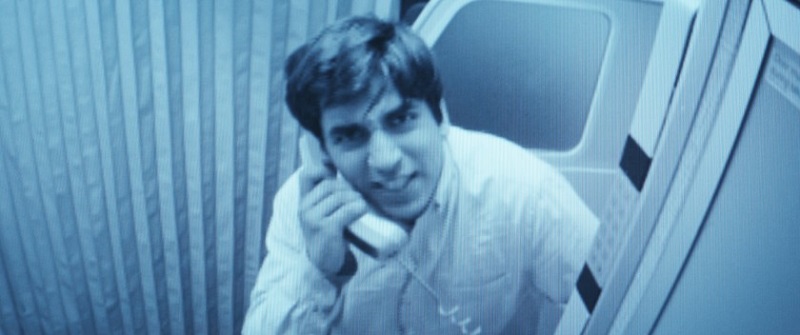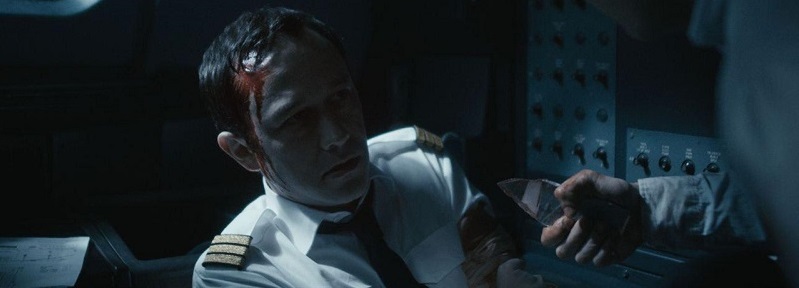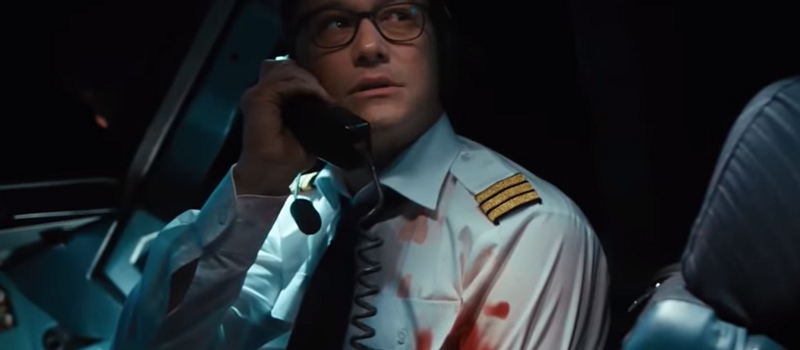The thriller is a genre that has been around as long as the cinema itself. When a film comes along that shakes up the structure, it should be—and usually is—celebrated and held up for pushing the envelope. The Matrix did that, so too did John Wick and now, we have 7500. The film, starring Joseph Gordon-Levitt, takes us inside the cockpit of a transcontinental jet as it is being hijacked while at 35,000 feet and we never leave. The cockpit. And it is absolutely a nerve-wracking experience and, in many ways, by going simplistic, has revolutionized the action-thriller milieu.

Gordon-Levitt stars as co-pilot Tobias Ellis, an American flying for a European airline with German pilot Michael Lutzmann (Carlo Kitzlinger) leading the Berlin to Paris flight. Terrorists try to get into the cockpit when one of the flight attendants bring the pilots some sustenance. One manages to get into the normally locked-down area before Ellis slams the door behind him as the hijacker stabs Lutzmann repeatedly and even gets a major gash across Ellis’ left arm. The co-pilot smashes the terrorist with a fire extinguisher and renders him immobile. Before long, it becomes clear that Tobias’ lead pilot has passed, and the weight of the entire flight has been thrust upon his shoulders. Making things complicated, he is in a serious relationship with one of the flight attendants and they have a son together waiting for them at home in Berlin.
With painstaking precision, writer-director Patrick Vollrath takes viewers inside the cockpit from the film’s opening moments. The procedures that pilots must go through prior to take-off is shown in all its pedantic meets pressing nature. As Gordon-Levitt and Lutzmann go through their pre-flight check and everything it takes to get the plane ready for takeoff electronically, it feels as if these two actors are pilots and thanks to Vollrath’s incredible research depth, it all is for a higher purpose. That is the service of the story. There is foreshadowing in every single frame of the first act in a way that superbly heightens the tension as this terror unfolds.
We do not know what the demands of the hijackers are, that’s due to Ellis managing to get that cabin door shut and locked before any more of the four-to-six terrorists could take control of the plane. They firmly have control of every other aspect of this flight. We hear all passengers have been shuttled to the rear of the aircraft while a constant banging on the cockpit door by the group’s leader permeates. All we, and Ellis, have to discern what is going on with the passengers and their captors is a small, black-and-white screen that produces an image from just on the other side of the cockpit door. Ellis can never see beyond the galley that sits right outside the door. But he (and thus, we) can hear the frenzy of terrified passengers and determined antagonists. Vollrath never has his camera leave Gordon-Levitt and that confined space that is the front of a massive aircraft. First of all, that constant banging—as it fluctuates from frustratedly fierce to exhausting exasperation—is utterly jarring (and constant). It’s unnerving for the viewer and that is exactly the point.
What is Ellis going to do? His pilot is dead. He is bleeding profusely. The unconscious hijacker, whose hands are tied behind him with tape as he’s seat belted in, won’t stay that way for long. Gordon-Levitt, during this period of the horror, has to emit much of what is going through his head merely through his face and body language. What the actor achieves is powerful. It is through his performance that our collective fear is exponentially heightened. We know that the love of his life and the mother of his son is on the other side of that door. We know that under no circumstances is he to open that door. He tells the hijackers that, and that is reinforced with his communication with ground control. It may feel that we are at an old-fashioned standoff, but the regulations for these situations couldn’t be clearer. Even if it means the slaughter of every passenger on that jet, handing over access to flying the plane is never an option.
Things escalate and as such, Gordon-Levitt’s character is compelled to go through an emotional hell. Yet, he cannot do anything about it. Ground control has informed him to conduct an emergency landing in nearby Hanover where the authorities will take it from there. But there’s a twist. Often times, in a thriller, the filmmaker can ask their audience to take a leap of faith for the payoff of the culmination of all the dramatic puzzle pieces that have been placed along the way. That is not the case with 7500. Vollrath has us living vicariously through Gordon-Levitt and as such, this is not a film for the faint of heart. It grabs you on a myriad of fronts and never lets you go, right up to—and including—the stunning final shot.

Vollrath’s script (which was co-written by Senad Halilbasic) is so wickedly smart. The entire set-up is truly simple, but its execution is anything but. What’s wild is that there is an innate expectation to feel claustrophobic with the film’s set-up and dramatic evolution. Yet that never occurs. Somehow, the filmmaker has managed to shoot in an incredibly confined space that is a plane’s cockpit and still it feels as if we have room to breathe. One would think that shooting 7500 would be comprised of a series of close-up shots—one after another. Instead, the viewer is so awash in a raging waters-like escalation of tension that the viewer could not feel more present and urgent.
For Gordon-Levitt, this film is like his Cast Away. Whether the film is successful in its wildly original undertaking largely rests on his talents. His work, of late, has been so stellar—from Snowden to The Walk. It should hardly surprise that he is chillingly commanding. He does so with levels of charm, immediacy, and panache that produces an affinity for Ellis and elevates our emotive connection to the distresses that unfold over 90 minutes. By merely hearing the horrors, it almost makes it worse … especially knowing Ellis’ familial connection to what is happening on the other side of that door.
How filmmakers captured the pain of life and death decisions as it weighs on one individual is beyond brilliant. It’s not usually something we think about as passengers on a plane. But this film will have every single individual who witnesses its glory think differently at how pilots hold the fate of countless souls firmly in their hands. 7500 makes that painfully clear. Vollrath encapsulates the emotional toll on an individual through adrenaline-charged panic impeccably.

The camera work by cinematographer Sebastian Thaler, especially given the confined circumstances, is palpable. Viewers feel everything, from the pounding of turbulence to the actual assault by the hijackers.
7500 simultaneously speaks to the human capacity for evil and heroism, especially when the sacrifice couldn’t be more personal. Gordon-Levitt delivers a herculean performance, all from the co-captain’s chair of an intercontinental aircraft. The emotional rawness couldn’t be sharper. Keenly aware of the emotional firestorm that Vollrath has crafted, he could have concluded his epic feel of a film with the usual action-thriller movie conclusion that wraps everything up nicely (i.e. calmly). Not here, as 7500 concludes with the filmmaker dropping an emotional anvil on his audience. That’s fitting, as it is reflective of the previous 90 minutes of heart palpitation-inducing cinematic joy.
Grade: A

